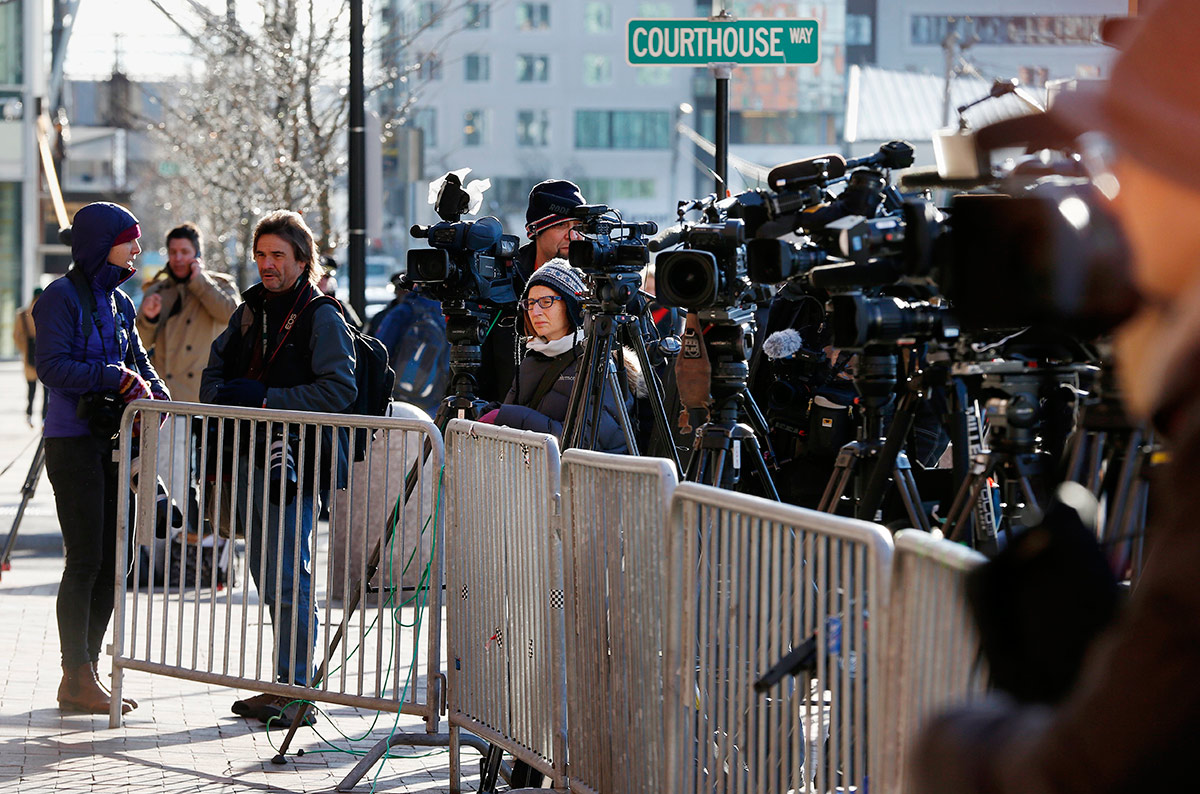Jury Selection Begins in Dzhokhar Tsarnaev Trial

Media take positions outside the federal courthouse in Boston for the first day of jury selection in the trial of Dzhokhar Tsarnaev. (AP Photo/Michael Dwyer)
The trial has begun. This morning, Dzhokhar Tsarnaev stood before 200 of the 3,000 Eastern Massachusetts residents expected to be called for jury duty in his case. Over the next few weeks, U.S. District Judge George O’Toole Jr. and attorneys on both sides will whittle down the jury pool to 18 people—12 jurors and six alternates—who will ultimately decide Tsarnaev’s fate.
O’Toole stood in the jury selection room on a podium flanked by the prosecution on one side, the defendant and his legal team on the other, and recited the instructions he will repeat numerous times in the days ahead.
The judge said he is seeking a panel “with a firm disposition to justice fairly and impartially.” After his instructions, the jurors were asked to answer a written questionnaire. “There are no right or wrong answers,” O’Toole said.
Jurors will then be given a phone number to call to see if they will be asked to return for an oral interview. Jury selection is expected to last three weeks with the arguments scheduled to begin on January 26.
O’Toole and the attorneys face the difficult task of weeding out jurors who hold biases against Tsarnaev. Jurors must be “death qualified,” meaning that they must be willing to apply the death penalty in some instances. People who believe the death penalty should be applied to everyone convicted of first-degree murder will be barred from the jury panel.
Tsarnaev, who has been held alone in a cell in Fort Devens for a year and a half, appeared noticeably more relaxed since his last pre-trial hearing in December. He wore a gray collared shirt, his hair was disheveled, and he didn’t fidget as much. He sat next to his attorneys, Miriam Conrad and Judy Clarke, and looked at O’Toole while he spoke to the jury pool.
Tsarnaev, 21, faces 30 charges stemming from the 2013 Boston Marathon bombings. The trial is expected to take more than three months to complete, and because it’s a capital case, it will be carried out in two parts. In the first part, the jury will decide on Tsarnaev’s guilt. If he is found guilty, then the jury will rule on whether he will receive the death penalty.
The death penalty in Massachusetts is banned under state law but still applicable under federal law. Out of 500 people charged capitally in federal cases since 1988, only three have been put to death. No one in Massachusetts has been executed since 1947.
A 2013 Boston Globe poll showed that 57 percent of Boston residents support a life sentence for Tsarnaev, while only 33 percent believe he should receive the death penalty. Yet a 2014 Globe poll showed that 62 percent of Massachusetts voters approved of Attorney General Eric Holder’s decision to charge Tsarnaev capitally.
The trial started today despite pushback from the defense to the delay the trial and move it out of Boston. Over the weekend, the First Circuit Appeals Court struck down Tsarnaev’s petition in a 2-1 decision. Tsarnaev’s lawyers argued it would be impossible to seat an unbiased jury from a pool of residents from Eastern Massachusetts, in a courtroom less than three miles away from where the attack occurred.
Notably absent outside the courthouse today were protesters proclaiming Tsarnaev’s innocence. At Tsarnaev’s final court hearing in December, some protesters clashed with bombing victims leaving the courthouse. After the hearing, Tsarnaev’s defense wrote a motion asking for the “self-appointed supporters” to keep a distance from courthouse, arguing it count taint the jury selection process and his right to a fair trial.
There was one single man with a sing reading, “prayers go out to the victims.” Dean Blake said he traveled from New Hampshire to be here today and support the families of 8-year-old Martin Richard, 29-year-old Krystle Campbell, 23-year-old Lu Lingzi, who died in the bombing, as well as the hundreds of the people who were injured.


